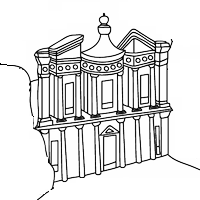Egyptian nationalism and Arab nationalism
For a century and a half, the history of the Afro-Asian borders can be analyzed as a rise of Egyptian nationalism, in parallel with an awareness of Arab nationalism.
Egypt found its modern identity with Mehemet Ali in 1805. But it was only towards the end of the nineteenth century that the British tutelage aroused in reaction a national awareness. The creation of an Egyptian nationalist party, which will become the Wafd in 1909, coincides with the influx of foreign officials who are hogging key positions at the expense of local elites.
In 1914, the proclamation of the British protectorate, replacing the official suzerainty of the Ottomans, at war with Germany, is less felt than the testimony of the Khedive Abbas Hilmi, replaced by Husayn Kamil, appointed Sultan. Nationalist reaction is developing. ZarhlQl, the Wafd leader, plays a leading role. Measuring the error committed, Britain suppresses the protectorate in 1922. King Fu'ad I ascends the Egyptian throne. But the growing nationalist pressure forces England to recognize the independence of Egypt. Fu'ad's successor, Farouk, is trying to reduce the influence of the Wafd. However, during the Second World War, Egyptian public opinion openly demonstrated its growing hostility to the British presence in the Suez Canal area. To defuse this threat, the British support the leader of the Wafd, Nahhâs Pasha, who becomes Prime Minister of Egypt. After the Second World War, Israel's independence and the ensuing brief war with the Arab states led to the defeat of Israel. It is more than one can bear on the banks of the Nile, Egyptian nationalism is strengthened.
In 1952, a junta of Free Officers sheltering behind General Neguib seized power, overthrew King Farouk and proclaimed the republic.
At this first stroke of success follows the nationalization of the Suez Canal, conducted by Nasser who replaced Néguib. The clever political resistance that Nasser managed to oppose the combined offensive of the English, French and Israelis turned a military defeat into a diplomatic victory. The aggressors of Egypt must retreat under international pressure. Nasser, who comes out victorious in this event, galvanizes the entire Arab nationalism.
The creation, on February 1, 1958, of the United Arab Republic (UAE) links Egypt and Syria, then the enlargement of the R.A.U. in Yemen outline the vast Arab federation of which Nasser dreams. This attempt fails as a result of political dissension.
Nasser's Pan-Arabism is moving towards Arab economic solidarity, which is gradually shifting towards new joint actions against Israel, including the creation of the Palestine Liberation Organization (PLO).
The fight against Israel advocated by the raïs should accelerate the constitution of Arab unity. But the failure of the six-day war undermines this policy. Nasser, forced to be cautious, now confines his action to arbitrations between Arab states and to maintaining good bilateral relations with them.
With Sadate, who succeeded Nasser in 1970, peace with Israel takes precedence over seeking Arab leadership. Relationships are deteriorating with Jordan. But the October war helps to strengthen ties with Syria, to give pride to the Egyptian army and to unblock the diplomatic situation. The opening of separate Israeli-Egyptian negotiations through the announcement of Sadat's surprise trip to Jerusalem, then the Egyptian diplomacy's orientation towards the Camp David Accords, begin a peace process with the Jewish State, which deeply divides the Arab World. The establishment of a Front of Firmness isolates Egypt from the rest of the "brother countries". Member States of the Arab League adopt retaliatory measures against Egypt.
After the assassination of Sadat, Mubarak follows a diplomatic line similar to that of his predecessor. The peaceful recovery of Sinai gives some prestige to this policy. But the Arab world is now crossed by religious currents that pass more through Tehran than Cairo.
National pride, myths and realities
A common idea among the newcomers to Egypt is that Egyptians, all Egyptians, be fascinated by the fabulous past of their country. Upon arrival on Egyptian soil, reality is responsible for disappointing the utopian. The indifference of the ordinary people and even the middle classes to the past civilizations of the Nile is commensurate with the difficulties of their daily lives. Only a tiny minority of scholars remember that Egypt was ruled by pharaohs. For the others, the national pride is elsewhere.
Nasser's prestigious shadow blends with the memory still present in all the spirits of a period when Egypt polarized the attention and admiration of the Arab world. The conviction that this period is not over continues to live as well the taxi driver Cairo as the nilotic teacher, the official or the guide for tourists. It is based on the honor found in the "crossing" when his army crossed the canal in October 1973 and stormed the Israel-raised Bar Lev line on the Egyptian territory of Sinai. She remembers that the Aswan high dam was also imposed on the concert of the world powers. It also has good reasons to build on the reconstruction.
In Port Said (Bûr 'Saïd) where 25,000 houses were razed, the roads destroyed, the city deprived of water and electricity, the reconstruction brought out of the ground a new city. Barely a year after the hard fighting of 1973, the first boat could once again anchor in the harbor. 700,000 explosive devices, ranging from the rocket to the simple hand grenade, were removed from the Suez Canal. And traffic was able to resume on the famous waterway, a year and a half after the October war.
But these memories fade with time. For younger generations, national pride can be seen in the evocation of developments that upset the country. This immutable Egypt is moving. His agriculture, frozen since the time of the pharaohs, is now pushing his crops through the desert sands. Already the New Valley which unites the Libyan oases is a reality. Perhaps, one day, the wildly ambitious project that wants to turn the Kat-tara depression into a polder will take shape. In the meantime, the Sinai desert is home to rice paddies and oil ports, manganese factories and seaside resorts.
"Raise your head, brother!" Nasser had sent him in 1973. The message was heard.



















